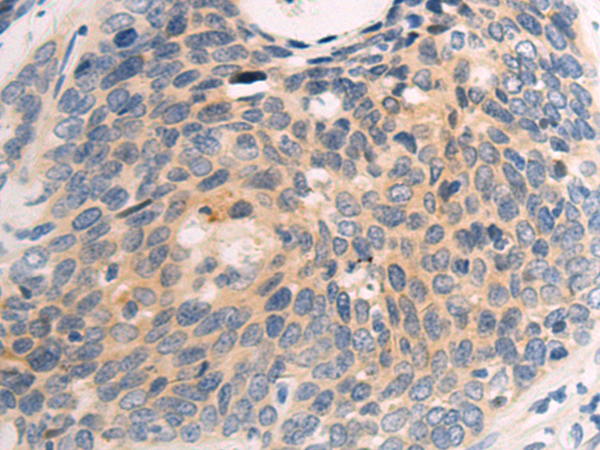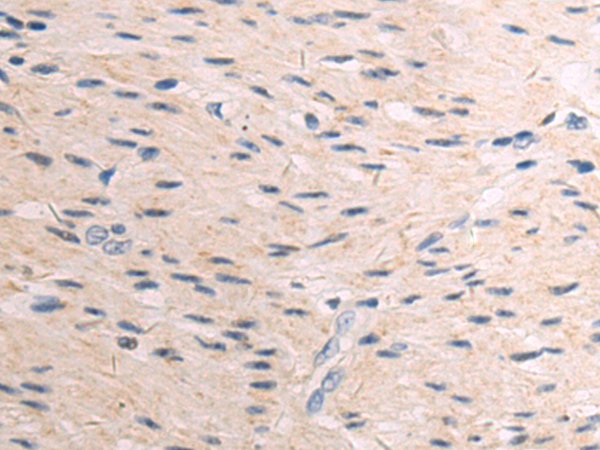

| WB | 咨询技术 | Human,Mouse,Rat |
| IF | 1/20 | Human,Mouse,Rat |
| IHC | 咨询技术 | Human,Mouse,Rat |
| ICC | 1/50-1/200 | Human,Mouse,Rat |
| FCM | 咨询技术 | Human,Mouse,Rat |
| Elisa | 咨询技术 | Human,Mouse,Rat |
| Aliases | NT3; HDNF; NGF2; NT-3; NGF-2 |
| Host/Isotype | Rabbit IgG |
| Antibody Type | Primary antibody |
| Storage | Store at 4°C short term. Aliquot and store at -20°C long term. Avoid freeze/thaw cycles. |
| Species Reactivity | Human, Mouse, Rat |
| Immunogen | Synthetic peptide of human NTF3 |
| Formulation | Purified antibody in PBS with 0.05% sodium azide and 50% glycerol. |
+ +
以下是关于GRP78/BiP抗体的3篇代表性文献及其摘要简介:
---
1. **文献名称**: *GRP78: A cell surface receptor for viral invasion and tumor targeting*
**作者**: Lee AS 等
**摘要**: 该研究揭示了GRP78/BiP在癌细胞表面异常表达的现象,并证明其可作为病毒入侵(如登革热病毒)和肿瘤靶向治疗的受体。抗体阻断实验显示,针对GRP78的抗体可抑制病毒内化并诱导肿瘤细胞凋亡。
---
2. **文献名称**: *The role of BiP/GRP78 in protein folding and endoplasmic reticulum stress*
**作者**: Gething MJ 等
**摘要**: 文章系统总结了BiP/GRP78作为内质网分子伴侣的功能,包括调控未折叠蛋白反应(UPR)和维持内质网稳态。研究还探讨了通过抗体靶向BiP以增强内质网应激反应在癌症治疗中的潜在应用。
---
3. **文献名称**: *Antibody-mediated targeting of GRP78 enhances chemosensitivity in solid tumors*
**作者**: Pyrko P 等
**摘要**: 该研究利用GRP78特异性抗体与化疗药物联用,证明抗体可通过抑制GRP78的细胞保护功能,增强肿瘤细胞对化疗的敏感性,尤其在多形性胶质母细胞瘤和胰腺癌模型中效果显著。
---
如需更具体的研究方向或实验细节,可进一步提供关键词补充!
GRP78 (Glucose-Regulated Protein 78), also known as BiP (Immunoglobulin Heavy Chain Binding Protein), is a member of the heat shock protein 70 (HSP70) family primarily localized in the endoplasmic reticulum (ER). It serves as a critical molecular chaperone involved in protein folding, quality control, and ER stress response. During ER stress, GRP78/BiP dissociates from transmembrane sensors like PERK, IRE1. and ATF6. activating the unfolded protein response (UPR) to restore cellular homeostasis or trigger apoptosis if stress persists.
GRP78/BiP antibodies are widely used in research to study ER stress dynamics in diseases such as cancer, neurodegenerative disorders, diabetes, and viral infections. In cancer, GRP78 overexpression is linked to tumor progression, drug resistance, and poor prognosis, making it a potential therapeutic target. In neurodegenerative conditions like Alzheimer’s or Parkinson’s disease, its dysregulation correlates with protein aggregation and neuronal death. These antibodies enable detection of GRP78 expression levels via techniques like Western blot, immunohistochemistry, and immunofluorescence, providing insights into disease mechanisms.
Additionally, GRP78/BiP antibodies are instrumental in exploring its non-canonical roles, including cell surface signaling in cancer and viral entry mechanisms (e.g., SARS-CoV-2). Their application extends to drug development, where modulating GRP78 activity is investigated for therapeutic benefits. Overall, GRP78/BiP antibodies are essential tools for understanding ER stress biology and its implications in health and disease.
×